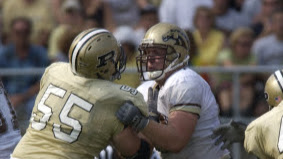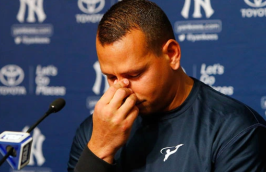DON’T PAY COLLEGE ATHLETES! I repeat. DON’T PAY COLLEGE ATHLETES! Leave your thoughts as a comment. I’d love to read your opinion.
This week, Gavin Newsom, Governor of California, passed the Fair Pay to Play Act allowing college athletes in California to be paid for their likeness. It’s going to open a Pandora’s Box of problems we can’t even begin to imagine. It’s the beginning of the end of college sports as we know them today.
Does that sound dramatic? Sure it does. But being a former student-athlete myself, I know first hand what goes on behind closed doors on a college campus. And I know for a fact that scholarship athletes have more than enough provided for them (legally) to have a pretty comfortable life while they help generate billions of dollars in revenue.
Tim Tebow went off about this topic during a recent interview. While I typically don’t love the guy, I agree with his point of view that collegiate athletes shouldn’t be paid. Jason Gay, sportswriter in the WSJ, has a differing opinion and doesn’t think this new law is a bad idea. Jason writes a decent column and I typically enjoy it, but he’s dead wrong on this one.
I hear the arguments all the time. “Why should everyone else make millions of dollars and the players can’t?” Another good one is “Athletes are the only students on campus that can’t make money. No other students are forced to pass up being paid.” Those arguments don’t hold water. I stayed on campus all four summers to work out with the team while playing college football. Each summer I got a job and saved as much money as I could to give me spending money I needed for the rest of the year. Nothing was stopping me from getting summer job and earning money. The money I saved, in conjunction with the money I received through my scholarship allowed me to make it through without going into any debt. How many kids coming out of college today can say they have zero debt? Not many.
After college people enter the capitalistic real world. There’s still a major disparity between people at the top and the bottom. The average CEO made 287 times more than their workers in 2018. Is that right? Maybe not, but college athletics isn’t the only place on earth where the worker bees generate massive wealth for people at the top. Also, we must remember, there is a major value to getting a college education paid for and that value continues to rise. Essentially, as college tuition increases, the value student-athletes are receiving continues to rise as well, at a much higher clip than income percentages.
One major difference between college and the real world is that college is putting athletes in a position to have options, to get to the top, to be that CEO one day. Student-athletes get the opportunity to get their education paid for. Maybe I’m naive, but getting my degree, learning how to save, and working hard during the summer has put me in a much better financial position today as I enter my 40s than a few thousand dollars would have done for me while I was in college. I say a few thousand because I was an offensive lineman. I can’t imagine companies are salivating over spending millions on a bunch of Hoggies. “Sour grapes huh, Jake?” Not really, but I’m sure offensive linemen would love to see their starting QB roll up in BMW while they cruise into camp in their Chevy Corsica.
Even if I did get cash handed to me, I likely would have done something stupid with the money that caused me to miss a class or two. It might have caused me to lose focus on school and sports altogether, thus getting me kicked out of school. Remember…Pandora’s Box. When players start missing classes and practice for a photo shoot, coaches are going to love it!!
What we might want to consider is some additional investment in classes about financial responsibility. Most college kids are terrible with money. This is yet another reason not to throw more at them. Some might say, “Sure Jake, you were lucky. You had parents that could send you money.” I love my parents dearly, but if you knew them, you know they weren’t throwing money my way. They raised me with a good head on my shoulders and I didn’t go without what I needed. That’s true. But I wasn’t born with a silver spoon in my mouth. My dad was so excited when I got my scholarship, he retired from the fire department at age 52. He has lived just fine ever since, but he wasn’t shipping me his retirement checks. If they never took me out to dinner after a game or sent me a couple dollars when they could afford to now and then, it wouldn’t have been the reason I didn’t make it.
Part of the right of passage into being a successful adult is struggling a little. It’s ok to not have everything you ever wanted when you’re in college. It’s ok to have to buy Busch Light 30 packs on Saturday before you go out and spend as little as humanly possible at the bar. It’s ok to go to Jimmy John’s and get an extra loaf of day-old. I still do that today!
Yes, being a student-athlete is tough. It’s one of the hardest things I’ve ever done. But there are also pretty great benefits to being a student-athlete. While it may not be right, my teammates and I got preferential treatment everywhere we went. On top of getting school paid for, we didn’t have to wait in line anywhere. We got free food and drinks all the time. People, yes mainly girls, were overly nice to us. We literally lived like kings for five years. I don’t see every kid on campus getting treated like that, even the rich kids with their parent’s credit cards.
What I find interesting is that as soon as athletes are out of college, I don’t hear anyone barking about the job a former athlete may or may not have gotten. More than 98% of us don’t go to the next level. Do people really believe the money an athlete can make in college is going to put them on the path of success for the rest of their life? I can assure you it’s not. Even the majority of pro athletes are broke soon after they leave their respective sport. “But Jake, these guys can’t even afford to go to the movies.” I’ll say it again, it’s ok to struggle a little. We need to focus our energy on preparing student-athletes for life and stop worrying about the short window in time that is college.
I could literally write about this topic for days. I could go into the problems money could bring into the individual locker rooms between different units. I could discuss how this could make the divide in college football have and have-nots even larger than it is today. I could discuss the impact this would have on gender inequality. How would you even begin to think about financial equality across the football team at Ohio State and the figure skating team at Western Michigan? The discussion is endless. I think healthy debate is good and there are definitely actions that can be taken to further invest in our college athletes, but putting money directly into their pockets the way it’s being proposed is going to be a problem.
Let me know your thoughts by leaving a comment. This debate is just getting started.


 For example, I’m pretty confident I wouldn’t lose any sleep if A-Rod woke up tomorrow without a dime to his name. He’s a disgrace.
For example, I’m pretty confident I wouldn’t lose any sleep if A-Rod woke up tomorrow without a dime to his name. He’s a disgrace.


